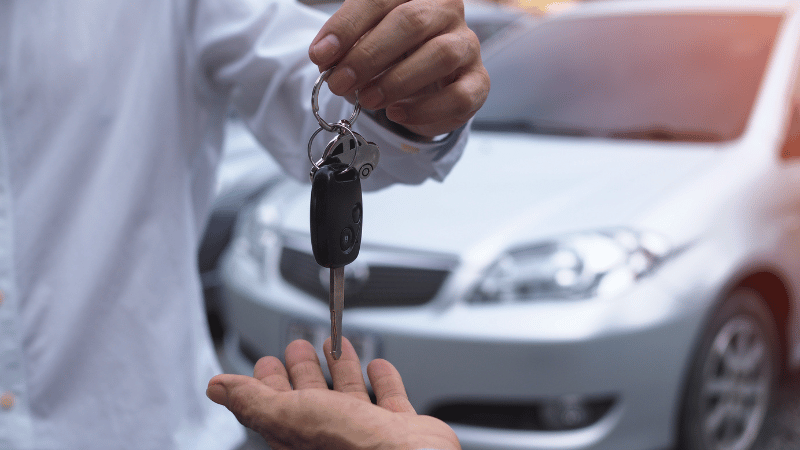Categories
How Does Finance on a Car Work? 12 Steps

When you’re looking to finance a car, there’s almost too much to learn - the difference between HP and PCP, the ins and outs of balloon payments, and what really happens if you miss a payment.
Wouldn’t it be easier if someone just told you what to do and how to sort it all out? We’re here at Clifton Private Finance to do just that.
Join us for this step-by-step guide.
And to compare rates and quotes from multiple lenders, get a quick quote:

1 - Assessing Your Finances
Can you afford a car? The first stage in getting car finance is working out just how much finance you need and whether you’re actually likely to get it! Your budget is the most important factor in getting a car, so don’t skimp on this step!
There are a few parts to assessing your finances:
Your monthly budget
Car finance means paying every month for the car, so you need to know how much you can realistically afford.
When working out your monthly budget, it’s important to remember the extra costs of having a car which may include:
Insurance - You can save a bit by paying for your insurance up front for the year (remember to factor that in if you are planning to do so), but many people pay for insurance monthly. However you intend to do that, add the cost.
Insurance can come as a shock, so it’s worth taking a little time doing some speculating and using cost comparison sites to see exactly what it might be. You may also be pleasantly surprised (though we doubt it).
Fuel / Energy Bills - Whether petrol or electric, getting your car to do the miles is going to cost you a fair penny. Work out how many miles you’re likely to do, and try to calculate the amount it’s going to be.
There are some online calculators to help, or you can use our method for calculating the cost of petrol.

Road Tax (VED) - Vehicle excise duty, or road tax, isn’t paid on the first year of a vehicle’s life, so if you’re planning on a brand new car, you’ll save this cost, but if not, you need to factor it into your budget. Like insurance, this can be paid annually or monthly.
Maintenance and Repairs - As you’ll see in this article, one of the advantages of owning a new car is the lack of maintenance costs, but if you plan to buy a used car, you’ll need to factor this in. Cars obviously cost more in maintenance the older they are, and if your car will be seven years old or more, you probably need to factor in a reasonable monthly cost for ongoing maintenance.
The initial payment
Called the initial payment or deposit, many car finance options will expect you to put some money forwrd upfront, and you should probably plan for 10% of your car’s value. There are ways around this, but be warned that saving on the initial payment will simply shift the costs over to spread over the months and make your regular payments that much higher.
It’s fairly common to use your current car in part exchange, covering most, if not all, of the initial payment. If not though, you need to have the cash ready to go.
Your credit score
Your personal credit rating is going to be a major factor in determining your car finance. There are plenty of online checkers that will let you see your credit rating, including those from Experian and Equifax, two of the most common credit rating agencies.
At Clifton Private Finance, we can help you get the car finance you need if your credit score is problematic. Contact our specialist car finance team to find out more.

2 - Choose The Car Finance For You
There are many ways to finance a car. Some of the top options include:
- Hire Purchase (HP) - Spread the cost of a car over the months with an aim for final ownership.
- Personal Contract Purchase (PCP) - Lower monthly payments with an option to own through a final balloon payment.
- Personal Contract Hire (PCH) - Long-term leasing with maintenance support but no final ownership, great for worry-free car use.
- Unsecured Personal Loan - Using a standard loan for car finance.
- Credit Cards - With clever juggling, a potential interest free option for buying a car.
To learn more about these options in detail, we recommend reading our comprehensive Ultimate Guide to Car Finance.

3 - Speak to Clifton Private Finance
We don’t often like to honk our own horn, but at this stage, speaking to one of our experts is really going to get you on the right road.
Driving ahead without getting some independent advice is going to mean you potentially miss out on some really good deals that could save you hundreds of pounds a year in your car finance.
Our team are perfectly placed to get you the car finance you need, so why not save yourself the hassle and give us a call? We’ll explain all your options and make sure you move forward with a finance deal ready to go.

4 - Find the Perfect Car
Whether you look online or visit used car dealerships, there are plenty of cars out there to suit. Research the type of car you want and get to know what the current choices are. If it’s been a while since you last bought a car, then there will be models and even makes that are unfamiliar to you. Take the time to read reviews and learn about the features.
If you can, take a few for a test drive and get to know how they feel. Often, what you think looks amazing or sounds great on paper simply doesn’t fit you. Try to rid yourself of preconceptions.

5 - Understand the Fine Tuning
Before you start talking to a dealership or filling in forms, it’s important you have a good understanding of any extras involved with your car. For example, do you want GAP insurance (you probably do), and have you properly calculated your annual mileage?
Look at all the options regarding your chosen car and give yourself time to consider what your answer is going to be for each question that comes up.

6 - Negotiate the Price
If you are buying your car in person, then haggling over the price of your car is a real thing - it’s not like buying bread in the supermarket.
Whether you’re buying new or old, it’s worth preparing for a conversation as you could knock hundreds, or even thousands, off the price - that’s a saving worth a day of your time.
Here are some top tips when it comes to buying your car:
- Know the car - You should be familiar with the car model and the fine tweaks and options. This helps you understand the price of your car and what’s realistic.
- Compare prices - The power of online shopping! Take a look around and learn what the best deals are.
- Set your limits - Before you even go near the showroom, determine your limit and be clear about what you want. When it comes to it, stick to it.
- Go mid-week - The weekend is busy, which means salespeople have less time for you. Go when they’ve not got so much on and you’ll find them far more receptive.
- Don’t be obvious - Opening with your true budget is a basic mistake. Play it cool, and you’ll get a better deal.
- Be nice - There’s no need to be snippy or antagonistic; being pleasant will get you much further (though don’t fall into the trap of thinking the salesperson is your friend… they’re not!)
- Don’t be rushed - You’ll be told you need to make a decision today (you don’t), that this is a special offer that’ll never be repeated (it’s not), and that there are a hundred people lined up to take the car (there isn’t). Take your time and…
- …Don’t be afraid to walk away - There are always other cars and other opportunities. If you are feeling put off, pushed into a decision, or uncomfortable in any way, then walk away.

7 - Finalise the Car Finance
You will be offered finance at the dealership - and it might even be good. With the research you’ve done earlier (plus, from speaking to us at CPF!), you should have your finance pretty much set, but now you have the opportunity to compare.
You’re in a position to negotiate on the finance, so use it.
Once you’ve made a decision, go through all the fine print, and make sure you understand exactly what you’re signing. Whether it’s online, on the phone, or in person, once you’re happy, you can agree to the car finance arrangement and pay any initial payment.

8 - Insurance and Registration
With the car finance in place, you need to register the car and get insured on it. This can often be done easily and quickly, either on the phone or online but remember, you can’t take possession of the car without it.

9 - Waiting, or Driving Away
In some cases the next stage is simply waiting; in others, it’s driving away.
- New car from manufacturer - If you’re getting a new car that’s coming from the manufacturer, then you’re going to be waiting a while; weeks, and maybe even a few months. Don’t worry - it’ll be worth it.
- New car from dealership stock - Even if you are buying from the dealership stock there’s a reasonably significant amount of paperwork and checks that have to be done before you can take the car. It’s usually best to leave and wait for a delivery in the next few days. If the option is there and you do choose to wait, then be prepared to sit for some hours while everything gets done.
- Used car from a main dealership - Like getting a new car from the dealership stock, buying a used car from a dealership doesn’t necessarily mean you can drive it away. Used cars in dealerships will be subject to the same comprehensive set of checks as a new car. Go home or be prepared for a long wait.
- Used car from an independent seller or small dealership - If you’re getting a car from a private seller or smaller dealership, then the chances are high you can drive away as soon as the paperwork is done. This may take some time, but is probably shorter than other options and many dealers can get it done in an hour or so.

10 - Car Inspection
Whether you pick up your car on the day or have to wait for a delivery, as soon as you get it, you should undertake a full inspection.
Car finance deals are secured against the vehicle, and in all cases, you will be expected to keep the car in a good condition. It is extra important, therefore, that when you get your car for the very first time, that you document its condition thoroughly. Disputes are uncommon, but if they happen, having photographic evidence on your side is extremely helpful.
During this time, it’s worth familiarising yourself with the car. Ask the dealer any questions you might have no matter how silly they might sound - ‘where’s the petrol cap release?’ is far less embarrassing at this stage than it is in a crowded petrol station!
You should also take time to look over documentation and make sure you’re aware of the warranty conditions.
When you are happy that the car is in the expected condition, you can sign for it and drive it happily.

11 - Make The Monthly Payments
A car finance deal means keeping up with monthly payments. Car finance, in all its forms, is relatively strict and prioritising payments is essential - for most people they come just under the mortgage in terms of importance. Make sure it is set up by direct debit and ensure there’s always money to cover it. Keep an active eye on your bank statements to make sure payments aren’t missed and the right amount is going out.
If you do have a problem making a repayment, make sure you proactively communicate with the finance company. Most issues can be resolved easily early on and become progressively more difficult with each week that passes. Don’t be scared to talk to your finance company - it is always better than putting your head in the sand.

12 - Ending the Contract
Depending on your car finance deal, you will have various options as the agreement reaches its end.
Hire Purchase / Conditional Sale / Personal Loan / Credit Cards - In all these cases, the end of the agreement means the car is yours and the finance is completed.
Personal Contract Purchase - You will have to make the decision whether to pay the optional balloon payment to own the car, or return it to the finance company. Perhaps you’d like to switch up for a different model. Speak to your finance company in good time to let them know your decision.
Personal Contract Hire - You will need to return the car to the leasing company.
Car Finance Help from Clifton Private Finance
At Clifton Private Finance we have a team of expert car finance specialists able to advise you on every aspect of your car finance needs - as well as steer you towards the best deals on the market.
Whether you’re looking for a hire purchase agreement for a used car you’ve seen locally, or a personal contract hire for a brand-new EV, we can help you save money.










